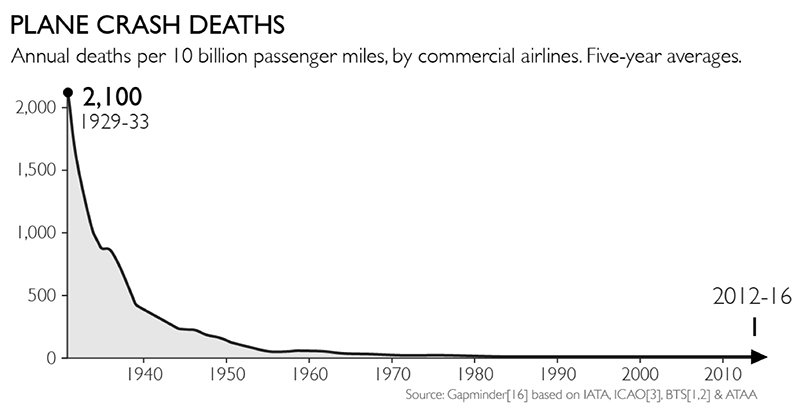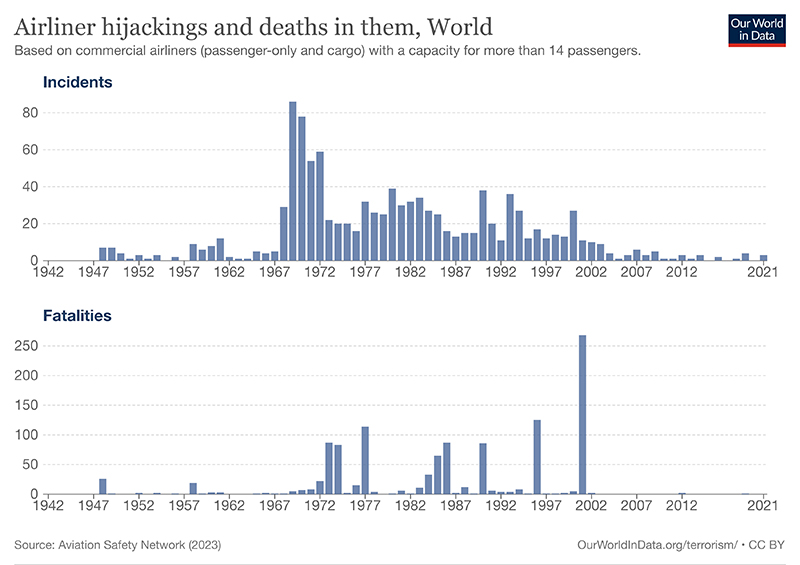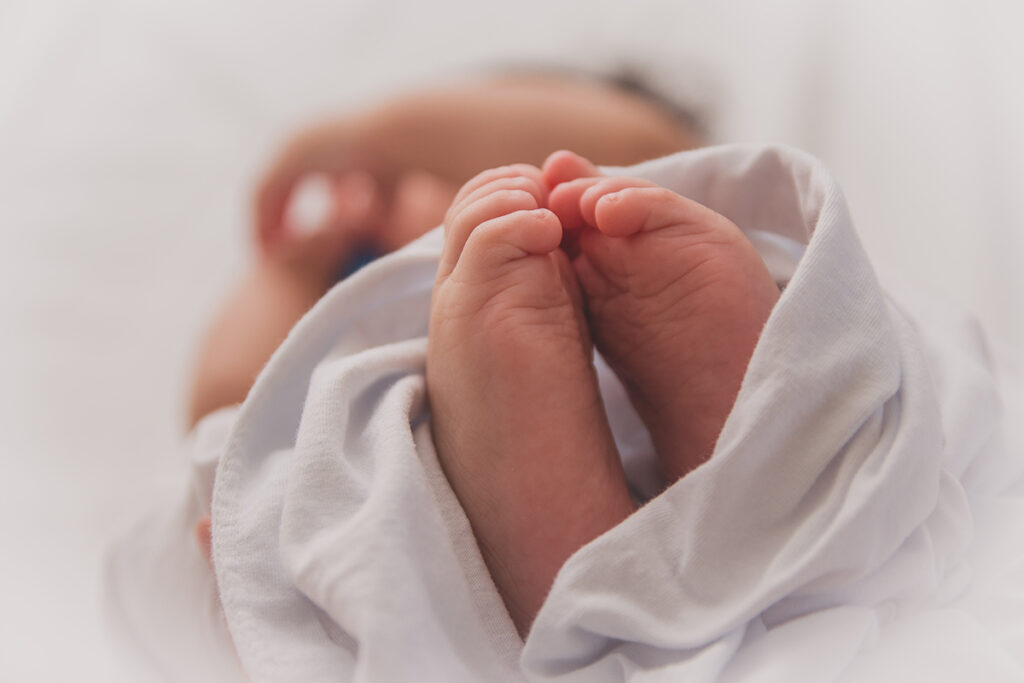Volcanoes are erupting in The Philippines, but on-fire Australia received some welcome rain. The Iran war cries have been called off and The Donald’s military powers are about to be hamstrung by the Senate. Meanwhile, his impeachment trial is starting, and we’re all on Twitter for a front-row seat.
What Could Go Right? As safe as taking a walk
On the miracle of modern aviation, from hijackings to accessibility
This is our weekly newsletter, What Could Go Right? Sign up here to receive it in your inbox every Thursday at 5am ET. You can read past issues here.
The miracle of modern aviation
I just returned from vacation in Kenya. On my way there, I fell into a conversation with another passenger, an American engineer, on our layover in Qatar. He was describing how pleasant flying used to be in the 1970s—delicious meals served with real utensils. Lots of space. Nothing like the cattle-herding feel of flying today, especially domestically. Apparently there was even free champagne.
I told him I would have been afraid to fly in the 70s, since flying is much safer nowadays. “I didn’t worry about crashing,” he told me. “The thing at that time was hijackings.”
I was sort of wrong, and he was right. Flying is safer today than in the 70s, but even then, fatalities from accidents were rare.

There used to be around five deaths per one million passengers in the 70s; as of 2020, it was .17 per one million.
As The Progress Network (TPN) Member James Fallows—who is a private pilot in addition to a veteran journalist—put it on his Substack, “On a statistical basis, being aboard a North American or Western European airliner is about the safest thing you can do with your time, compared even with taking a walk or sitting in a chair.”
I have flight anxiety, and I tend to repeat the “safer than driving” line about flying to myself upon takeoff. I’ll switch now to “as safe as sitting,” which is what we do on planes, anyway.
And what about hijackings? “Skyjacking” was in its heyday from the 50s to the early 70s, before security checks of passengers and their luggage existed. As Hannah Ritchie wrote for Our World in Data, that changed in the United States in 1973, when screening rules were first introduced.
Strict regulations and tight security weren’t consistently the case internationally, however, until after 9/11. At the Nairobi airport, I passed through three separate checks: one of passengers only, on the highway before entering airport grounds. One at the entrance to the airport terminal, of all bags. And one before the gates, of both passengers and carry-on items. “Things changed in Kenya after 9/11,” my driver explained.
Twenty-plus years on from the anniversary of 9/11, some speak of airport “security theater,” and frequent fliers in particular complain about the inconvenience and confusion (Laptop in or out? Shoes on or off? Liquids in a plastic baggie?). But these changes—and others, like stronger cockpit doors—have worked, Ritchie points out in her summary.
Skyjackings and their associated fatalities have all but disappeared. Since 9/11, the highest number of hijackings in a year has been six. Five people total have died.

This isn’t to forgive the modern aviation industry its ills. Sometimes it feels like Delta is trying to starve you into submission. The tall guy next to me on one of my Qatar Airways flights had his knees jammed into the seat in front of him. Everyone has experienced or heard horror stories about being bumped from flights and offered pittance in return, or monster delays. I returned to Athens on Tuesday—but my bag didn’t.
From a safety perspective, though, the industry is extremely impressive. In the same article cited above, Fallows writes on why its culture of learning from mistakes is a key element to its success. (And he looks here at why there have been some recent near misses in the US.)
And while those of us stuck in economy class have reason to complain about being packed in like sardines, part of the reason that metaphor works is because flying has become accessible to so many sardines. A 2022 report from the International Air Transport Association expects global flight passenger numbers to almost double by 2040 from pre-pandemic levels, due to Asia Pacific, Africa, and the Middle East becoming home to more people with more money.
Seeing this play out in real life was unexpectedly sweet. Kenyan families at the Nairobi airport took photos in front of the terminal signs. On my flight there, I was flummoxed at first when the young woman in the aisle seat next to me, dressed in an abaya and hijab, asked if it was possible for her to use the washroom. “I’m scared to go,” she added.
“Of course,” I responded. “It’s right there, a few rows behind us.”
“Thanks,” she said. “I didn’t know. This is my first flight.”
Correction: An earlier version of this newsletter cited .017 deaths per one million air passengers in 2020. The correct figure is .17 and has been corrected above. We regret the error.
Quick hits
- Our friends at Human Progress have a new data explorer and creator.
- Our Towns Civic Foundation, led by TPN Members Deborah and James Fallows, is seeing a shift ten years into their work on spotlighting American renewal at the local level: more and more people believe in it.
- Several states now allow sexual assault survivors to track their rape kits.
- Alert, new dictionary words added! Additions include nepo baby, Big Pharma, decision fatigue, and box braids.
Below in the links section, good news for 2,000 rhinos; signs of life in a world far, far away; death to the tampon tax in Texas; and more.

17 Fertility Scenarios

A shrinking population seems likely to lead to a shrinking economy, where innovation grinds to a halt. What are some other possibilities? | Read more
Progress, Please
(Found good news? Tweet at us @progressntwrk or email.)
Other good stuff in the news 🐻❄️
Energy & Environment:
- Why it may be time to stop using the polar bear as a symbol of the climate crisis | The Guardian
- Chart: Renewables are on track to keep getting cheaper and cheaper | Canary Media
- Golden eagles in Scotland at highest levels in 300 years | BBC
- No one wanted to buy 2,000 rhinos up for auction. What happened next is good news. | National Geographic
- The incredible shrinking energy use of a light bulb | Bloomberg
Public Health:
- Yes, there’s a new Covid variant. No, you shouldn’t panic | Wired
- Ozempic may let type 1 diabetes patients skip insulin | Futurity
- Chinese people are living two years longer thanks to ‘war on pollution,’ report says | CNN
Science & Tech:
- Tantalizing sign of possible life on faraway world | BBC
- Google to require disclosure for AI in election ads | Axios
- How AI may be a powerful tool in treating male infertility | BBC
- ‘Complete’ models of human embryos created from stem cells in lab | The Guardian
Politics & Policy:
- Texas is the latest state to drop the ‘tampon tax’ | The New York Times
- Arizona 911 operators to get unlimited mental health services | KTAR News
- Court decriminalizes abortion across Mexico | BBC
- The IRS plans to crack down on 1,600 millionaires to collect millions of dollars in back taxes | AP
- A huge threat to the US budget has receded. And no one is sure why. | The New York Times
Society & Culture:
- Hong Kong must have framework to recognize same-sex unions, court rules | The New York Times
- The app teaching Somalis to read and write | BBC
- South Korea: Lesbian couple welcomes child in historic first | PinkNews
TPN Member originals 🧠
(Who are our Members? Get to know them.)
- Gen Z is dropping the college dream. It’s time for America to catch up. | Emma Varvaloucas
- The American renaissance is already at hand | David Brooks
- We are the least bad of our kind | Scott Galloway
- Weight-loss drugs seem like another bit of sci-fi becoming fact | James Pethokoukis
- Can Poland roll back authoritarian populism? | Yascha Mounk
- How Chile won back its democracy | Ruth Ben-Ghiat
- The new Middle East, twenty-two years post-9/11 | Faisal Saeed Al Mutar
- Is AI’s ‘intelligence’ an illusion? | Ian Bremmer
- Polarization is a choice | Matthew Yglesias
- The Biden administration’s First Amendment violation | Isaac Saul
- The 50 autumns of the leaf blower | James Fallows
- The big questions about AI have nothing to do with killer machines | James Pethokoukis
- Three myths and four truths about how to get happier | Arthur C. Brooks
- What is ‘It is what it is’? | John McWhorter
Department of Ideas 💡
(A staff recommendation guaranteed to give your brain some food for thought.)
A constitution for teenage happiness | The Free Press
Ruby LaRocca—the winner of The Free Press‘ high school essay contest—urges her generation to read old books, memorize poems, and invite senior citizens to parties.
Why we picked it: It’s solid advice from a 17-year-old to her peers (and us all). See also: this solid advice from a 66-year-old to a 20-year-old (and us all). —Brian Leli
Upcoming Events
- What is the state of surveillance? | The Progress Network | September 26
Until Next Time
Dem bones, dem bones, dem dancing bones . . . 🦴👽


